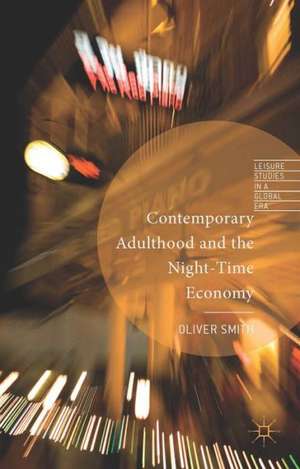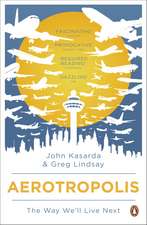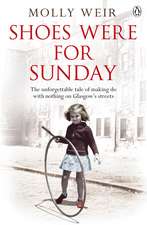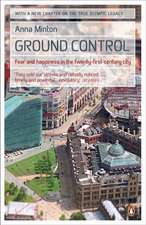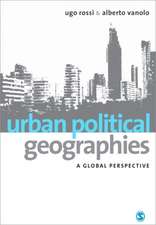Contemporary Adulthood and the Night-Time Economy: Leisure Studies in a Global Era
Autor O. Smithen Limba Engleză Hardback – 22 aug 2014
| Toate formatele și edițiile | Preț | Express |
|---|---|---|
| Paperback (1) | 382.36 lei 6-8 săpt. | |
| Palgrave Macmillan UK – 2014 | 382.36 lei 6-8 săpt. | |
| Hardback (1) | 385.84 lei 6-8 săpt. | |
| Palgrave Macmillan UK – 22 aug 2014 | 385.84 lei 6-8 săpt. |
Din seria Leisure Studies in a Global Era
- 18%
 Preț: 720.22 lei
Preț: 720.22 lei -
 Preț: 391.99 lei
Preț: 391.99 lei -
 Preț: 200.14 lei
Preț: 200.14 lei - 18%
 Preț: 946.24 lei
Preț: 946.24 lei -
 Preț: 384.48 lei
Preț: 384.48 lei - 18%
 Preț: 891.02 lei
Preț: 891.02 lei - 15%
 Preț: 584.26 lei
Preț: 584.26 lei - 18%
 Preț: 783.20 lei
Preț: 783.20 lei -
 Preț: 390.63 lei
Preț: 390.63 lei - 18%
 Preț: 724.63 lei
Preț: 724.63 lei -
 Preț: 384.31 lei
Preț: 384.31 lei - 18%
 Preț: 781.62 lei
Preț: 781.62 lei - 18%
 Preț: 736.64 lei
Preț: 736.64 lei -
 Preț: 386.22 lei
Preț: 386.22 lei -
 Preț: 382.36 lei
Preț: 382.36 lei -
 Preț: 386.61 lei
Preț: 386.61 lei - 18%
 Preț: 724.50 lei
Preț: 724.50 lei -
 Preț: 268.83 lei
Preț: 268.83 lei -
 Preț: 385.08 lei
Preț: 385.08 lei - 15%
 Preț: 645.14 lei
Preț: 645.14 lei - 18%
 Preț: 886.26 lei
Preț: 886.26 lei - 15%
 Preț: 582.30 lei
Preț: 582.30 lei - 15%
 Preț: 587.20 lei
Preț: 587.20 lei -
 Preț: 231.98 lei
Preț: 231.98 lei - 18%
 Preț: 894.97 lei
Preț: 894.97 lei - 15%
 Preț: 647.40 lei
Preț: 647.40 lei - 15%
 Preț: 640.24 lei
Preț: 640.24 lei - 18%
 Preț: 784.13 lei
Preț: 784.13 lei - 18%
 Preț: 783.81 lei
Preț: 783.81 lei - 15%
 Preț: 584.43 lei
Preț: 584.43 lei - 18%
 Preț: 730.97 lei
Preț: 730.97 lei -
 Preț: 375.84 lei
Preț: 375.84 lei - 18%
 Preț: 779.89 lei
Preț: 779.89 lei -
 Preț: 386.99 lei
Preț: 386.99 lei -
 Preț: 394.51 lei
Preț: 394.51 lei - 18%
 Preț: 948.92 lei
Preț: 948.92 lei
Preț: 385.84 lei
Nou
Puncte Express: 579
Preț estimativ în valută:
73.84€ • 76.62$ • 61.72£
73.84€ • 76.62$ • 61.72£
Carte tipărită la comandă
Livrare economică 17-31 martie
Preluare comenzi: 021 569.72.76
Specificații
ISBN-13: 9781137344519
ISBN-10: 1137344512
Pagini: 204
Ilustrații: IX, 204 p.
Dimensiuni: 140 x 216 x 18 mm
Greutate: 0.36 kg
Ediția:2014
Editura: Palgrave Macmillan UK
Colecția Palgrave Macmillan
Seria Leisure Studies in a Global Era
Locul publicării:London, United Kingdom
ISBN-10: 1137344512
Pagini: 204
Ilustrații: IX, 204 p.
Dimensiuni: 140 x 216 x 18 mm
Greutate: 0.36 kg
Ediția:2014
Editura: Palgrave Macmillan UK
Colecția Palgrave Macmillan
Seria Leisure Studies in a Global Era
Locul publicării:London, United Kingdom
Cuprins
1. Introduction 2. Socioeconomic Change, Work and Leisure 3. Binge Britain and the NTE 4. Consuming the City 5. Youth, Adulthood and the NTE 6. Drinking Biographies 7. Desire, Motivation and the NTE 8. Identity and the NTE 9. Work, Friendship and the NTE 10. Conclusions and Futures
Recenzii
"Avoiding both cliché-ridden hysteria, and the over-ripe products of redundant theoretical silos, Oliver Smith has produced a beautifully written, carefully nuanced account of post-industrial leisure that normalises and explains the contemporary night-time economy. Read it before going to the pub." - Dick Hobbs, Professor of Sociology, University of Essex, UK
"This book is a must read for anyone wanting to make sense of the relationship between 'extended' adolescence, alcohol consumption, and the night-time economy (NTE). Based on a thorough analysis of changes and trends in the NTE, and careful ethnographic observations and interviews with young adults, this book theoretically and empirically redefines the phenomenon of 'going out' in contemporary society." - Robert Hollands, Professor of Sociology, Newcastle University, UK
"In this superb ethnographic study of Britain's commodified and consumerised night-time economy, Oliver Smith bravely ignores the disciplinary injunction to identify cultural resistance blossoming across post-crash capitalism's arid landscape. Instead he finds anxiety, half-hearted hedonism and an enduring sense of lack among a community of thirty-somethings unwilling to give up the preoccupations of youth and unable to identify anything more appealing than another weekend trawling the pubs and clubs. Smith makes excellent use of critical theory to address the pressures that bear down upon so many young people today. He treadscarefully around the piles of puke and discarded beer cans to offer a trenchant and rigorous ethnographic analysis of depressive hedonism and ideological incorporation. It is not a happy story, but it is one that everyone interested in the reality of contemporary culture must digest. I can't recommend it more highly." - Simon Winlow, Professor of Criminology, Teesside University, UK
"Something odd is happening to the adulthood stage of the life cycle; something that, for the most part, criminologists have been slow to engage with. Oliver Smith's Contemporary Adulthood and the Night-Time Economy is a notable exception. Skilfully weaving sophisticated theory and interview data, Smith provides a sharp analysis of how the young (and the not-so-young) use alcohol and the night-time leisure economy to structure identity and give meaning to their lives as they attempt to negotiate today's long march to adulthood." - Professor Keith Hayward, University of Kent, UK
"This book is a must read for anyone wanting to make sense of the relationship between 'extended' adolescence, alcohol consumption, and the night-time economy (NTE). Based on a thorough analysis of changes and trends in the NTE, and careful ethnographic observations and interviews with young adults, this book theoretically and empirically redefines the phenomenon of 'going out' in contemporary society." - Robert Hollands, Professor of Sociology, Newcastle University, UK
"In this superb ethnographic study of Britain's commodified and consumerised night-time economy, Oliver Smith bravely ignores the disciplinary injunction to identify cultural resistance blossoming across post-crash capitalism's arid landscape. Instead he finds anxiety, half-hearted hedonism and an enduring sense of lack among a community of thirty-somethings unwilling to give up the preoccupations of youth and unable to identify anything more appealing than another weekend trawling the pubs and clubs. Smith makes excellent use of critical theory to address the pressures that bear down upon so many young people today. He treadscarefully around the piles of puke and discarded beer cans to offer a trenchant and rigorous ethnographic analysis of depressive hedonism and ideological incorporation. It is not a happy story, but it is one that everyone interested in the reality of contemporary culture must digest. I can't recommend it more highly." - Simon Winlow, Professor of Criminology, Teesside University, UK
"Something odd is happening to the adulthood stage of the life cycle; something that, for the most part, criminologists have been slow to engage with. Oliver Smith's Contemporary Adulthood and the Night-Time Economy is a notable exception. Skilfully weaving sophisticated theory and interview data, Smith provides a sharp analysis of how the young (and the not-so-young) use alcohol and the night-time leisure economy to structure identity and give meaning to their lives as they attempt to negotiate today's long march to adulthood." - Professor Keith Hayward, University of Kent, UK
Notă biografică
Oliver Smith is a Lecturer in Criminology at Plymouth University, UK.
